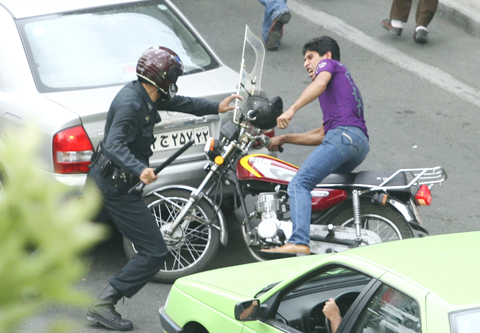Iranian President Mahmoud Ahmadinejad yesterday defended his hotly disputed re-election as security forces cracked down on opposition protestors in Tehran, where fresh violence erupted.
Police said they had rounded up a total of 170 people over the massive post-election protests and street riots which erupted in the Iranian capital after Ahmadinejad’s defeated challengers complained of fraud and vote-rigging.
Analysts have warned that the dramatic events could pose a risk to the future of the country, which has been under the control of powerful clerics since the Islamic revolution three decades ago.

PHOTO: REUTERS
But Ahmadinejad dismissed criticism of the election, saying at a press conference the massive turnout was a blow to the “oppressive system ruling the world,” a reference to the US.
He said his margin of victory over his main rival, moderate ex-prime minister Mir Hossein Mousavi, was so wide it could not be questioned and said the election was like a “football match” and the loser should just “let it go.”
But clashes flared again yesterday, a day after thousands of angry opposition supporters took to the streets over the election result, triggering rioting on a scale not seen in Iran for a decade.
In one street, police fired into the air to break up a demonstration, while on another, about 200 Mousavi supporters shouting “Death to the dictator!” lobbed stones at police, who fired back with tear gas.
Among those arrested by police were about 15 reformist leaders and supporters of Ahmadinejad’s defeated rivals who complained of fraud in the most hotly contested presidential election in the Islamic republic.
Tehran’s deputy police chief Ahmad Reza Radan said a total of 170 people had been arrested, including “masterminds” of the rioting, and warned that the security forces would deal “firmly” with the protests.
The election results dashed Western hopes of change after four years under Ahmadinejad, who set Iran on a collision course with the international community over its nuclear drive and his anti-Israeli tirades.
One leading conservative in Tehran insisted that US President Barack Obama’s “motto of change” and “velvet revolutions” had no place in Iran.
World governments have so far reacted cautiously, while voicing concern about the vote-rigging allegations and the election violence.
Official results gave 52-year-old Ahmadinejad 63 percent of the vote, crushing his closest rival Mousavi who gained just 34 percent.
But Mousavi, who has not been seen in public since the vote results, cried foul over what he branded a “charade,” saying it was marred by cheating and election irregularities.
Also See: ANALYSIS: Ahmadinejad’s win deals blow to Obama’s Iran plan

CHIP WAR: The new restrictions are expected to cut off China’s access to Taiwan’s technologies, materials and equipment essential to building AI semiconductors Taiwan has blacklisted Huawei Technologies Co (華為) and Semiconductor Manufacturing International Corp (SMIC, 中芯), dealing another major blow to the two companies spearheading China’s efforts to develop cutting-edge artificial intelligence (AI) chip technologies. The Ministry of Economic Affairs’ International Trade Administration has included Huawei, SMIC and several of their subsidiaries in an update of its so-called strategic high-tech commodities entity list, the latest version on its Web site showed on Saturday. It did not publicly announce the change. Other entities on the list include organizations such as the Taliban and al-Qaeda, as well as companies in China, Iran and elsewhere. Local companies need

CRITICISM: It is generally accepted that the Straits Forum is a CCP ‘united front’ platform, and anyone attending should maintain Taiwan’s dignity, the council said The Mainland Affairs Council (MAC) yesterday said it deeply regrets that former president Ma Ying-jeou (馬英九) echoed the Chinese Communist Party’s (CCP) “one China” principle and “united front” tactics by telling the Straits Forum that Taiwanese yearn for both sides of the Taiwan Strait to move toward “peace” and “integration.” The 17th annual Straits Forum yesterday opened in Xiamen, China, and while the Chinese Nationalist Party’s (KMT) local government heads were absent for the first time in 17 years, Ma attended the forum as “former KMT chairperson” and met with Chinese People’s Political Consultative Conference Chairman Wang Huning (王滬寧). Wang

CROSS-STRAIT: The MAC said it barred the Chinese officials from attending an event, because they failed to provide guarantees that Taiwan would be treated with respect The Mainland Affairs Council (MAC) on Friday night defended its decision to bar Chinese officials and tourism representatives from attending a tourism event in Taipei next month, citing the unsafe conditions for Taiwanese in China. The Taipei International Summer Travel Expo, organized by the Taiwan Tourism Exchange Association, is to run from July 18 to 21. China’s Taiwan Affairs Office spokeswoman Zhu Fenglian (朱鳳蓮) on Friday said that representatives from China’s travel industry were excluded from the expo. The Democratic Progressive Party government is obstructing cross-strait tourism exchange in a vain attempt to ignore the mainstream support for peaceful development

ELITE UNIT: President William Lai yesterday praised the National Police Agency’s Special Operations Group after watching it go through assault training and hostage rescue drills The US Navy regularly conducts global war games to develop deterrence strategies against a potential Chinese invasion of Taiwan, aimed at making the nation “a very difficult target to take,” US Acting Chief of Naval Operations James Kilby said on Wednesday. Testifying before the US House of Representatives Armed Services Committee, Kilby said the navy has studied the issue extensively, including routine simulations at the Naval War College. The navy is focused on five key areas: long-range strike capabilities; countering China’s command, control, communications, computers, cyber, intelligence, surveillance, reconnaissance and targeting; terminal ship defense; contested logistics; and nontraditional maritime denial tactics, Kilby